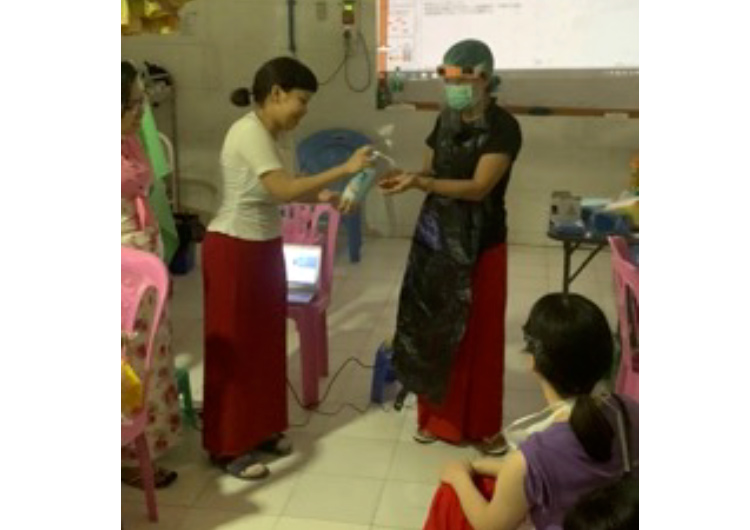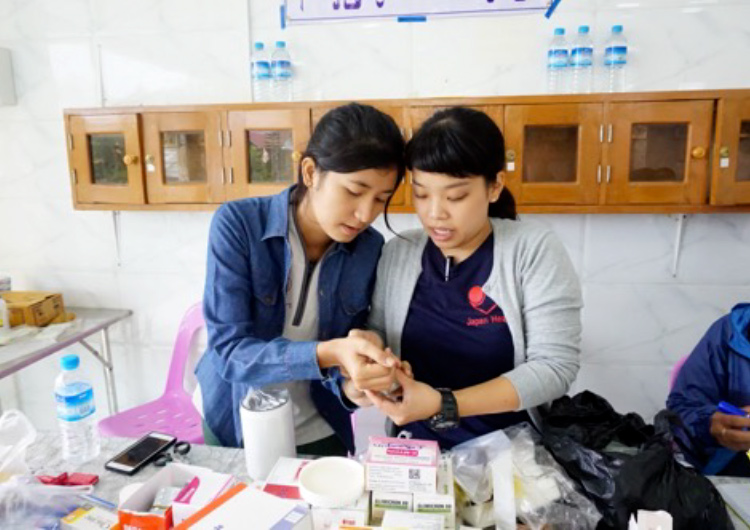My name is Kato and I am a volunteer nurse at Wachet Charity Hospital in Myanmar.
Thank you for always reading the activity reports.
Today I would like to share my experience this past year under the cloud of corona.
At the end of March 2020, surgical activities were being carried out as usual in Myanmar.
During this period, Myanmar discovered its first positive case of Covid-19.
From that point on, the world was caught in the chaos and turmoil of Covid-19 and one by one, countries around the world closed their borders and restricted flights.
Dr Yoshioka, the Chief Advisor of Japan Heart had his flight from Myanmar cancelled and rescheduled to a day earlier.
The surgical schedule is always tight and all of the surgeries have to be completed before Dr Yoshioka’s visit ends, so losing a day makes it even tighter.
In the end, all of the staff worked day and night to perform the necessary surgeries.
As the sun was rising on the departure day, we managed to finish all of the surgeries.
The following months, the Japanese staff at Wachet began returning home one after another.
There were various reasons such as their terms naturally ending and the influence of the spreading pandemic, and as a result I became the last Japanese standing at the hospital.
Until this situation, there has usually been 5 Japanese doctors and nurses stationed along with me as well as many short-term volunteers from Japan who participate in the monthly surgical schedules.
As a result, this was my first experience staying along for an extended period.
At the time, there weren’t many Covid positive patients in Myanmar and the situation was relatively calm compared to Japan where it was getting tighter and an emergency was declared.
There was nothing that I could do about the tough situation in Japan.
As a Japanese nurse, I felt conflicted about not being able to contribute to healthcare in Japan.
However, I had a job to do in Myanmar and with that in mind, I poured my work into infection control at Wachet.

* Infection control training with Burmese staff (Kato is on the left)
We read the infection control guidelines of Myanmar and Japan, received advice from our superiors and discussed infection control measures with local hospital staff.
Sometimes we butted heads during discussions and fundamental differences in thinking surface.
Even now, I still regret that I lacked an understanding of Myanmar and their medical care.
By increasing my experience here, I thought that I could gradually come to understand Myanmar in my own way.
Now that I am the only Japanese at the hospital, I have naturally gained more time to communicate with the Burmese staff than ever before, and little by little I think I am gaining a deeper understanding of Myanmar and the staff here.
To be honest though, this past year has been more tough than enjoyable, however I wouldn’t trade it and believe that I have had a special experience.
Additionally, the people of Myanmar always supported me, and cared about me and the situation in Japan.
“How’s Japan? Is your family well? Have you talked to them?”
“Are you feeling lonely? It must be tough. Let me know if you need anything!”
There is a lot going on, but I have been thinking that I can do my best because of these people.

Myanmar is still suffering the ongoing effects of the virus as well as political problems.
Over this past year, I have been doing my best to do what I can by taking part in surgical activities and monastery visits, but I haven’t been able to do as I did before.
Right now, there is still no prospect that Japanese medical professionals can travel.
We still have to keep trying to do our best.
As Japan Heart, we will continue to do all we can to support the people of Myanmar, and we hope that our supporters will continue to care about Myanmar too.

